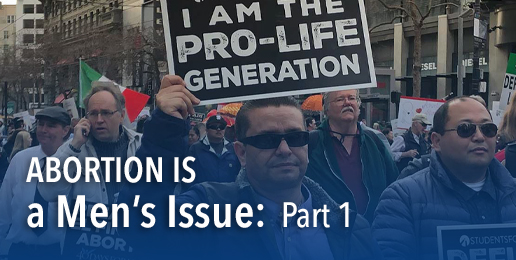
On a recent flight across the country, I sat next to a man who was probably in his late 20s or early 30s.
We’ll call him Joe. Joe seemed amiable and outgoing enough—he even threw in a friendly curse word here and there. So, as I usually do on airplane flights, I engaged my fellow passenger in conversation about a topic of real significance.
I asked Joe about his opinion on abortion.
(Full disclaimer: Almost none of these quotes are word-for-word quotes, but this is an accurate thought-for-thought account of our conversation.
Joe responded: “Hey man, it’s not really my problem. If I get some chick pregnant, then maybe it would be my problem. But it’s not really my deal; I’m a guy.”
Me: “Well, I hear a lot of people say that, but there’s one thing about that doesn’t make sense to me. I mean, I’m a guy, and I lived in my mother’s womb for nine months. I would have wanted someone to speak up for me if my mother had been considering abortion. As the quote goes, ‘Justice will not be served until those who are unaffected are as outraged at those who are.'” (A quote incorrectly (apparently) attributed to Benjamin Franklin)
Joe: “You’re not wrong about that, but I really don’t think it’s my problem. I mean, we’re both dudes, and abortion is a woman’s choice.”
Me: “But men are designed with a special responsibility to protect the vulnerable. I mean, if you had been living in Germany during the Holocaust, would you have felt a responsibility—as a man—to speak out against it?”
Joe: “Oh, dude, that’s not even a comparison. Not even close to the same thing.”
I took the opportunity to inform him that while Hitler killed 6 million Jews, sixty-two million babies have been killed through abortion in the U.S. since Roe v. Wade. (The number is now even higher than 62 million; I was remembering an old number during our conversation.)
I put it rather frankly:
“We’ve killed ten times as many people through abortion as Hitler did in the Holocaust. I agree with you—there’s not really a comparison there.”
After replying with a bit of snark, he ultimately asked me if we could agree to disagree.
I told him that we definitely weren’t enemies, but I was also not satisfied with our disagreement. And I wrapped up the conversation rather bluntly:
“I pray that the Lord raises up a generation of men who will defend the vulnerable instead of claiming that it’s someone else’s problem.”
Our interaction ended with a handshake and well wishes, but after I got off the plane, the conversation stirred up in me a frustration that has been gradually building over the last little while.
As a pro-life male, I used to feel somewhat at a disadvantage when it came to speaking out against abortion, for intuitive reasons. But then I met an anti-abortion activist—Andrew Kerin of Tiny Heartbeat Ministries—who reframed the issue entirely in my mind. (To give credit where it is due, much of the following comes straight from his insight.)
Think about it this way: by brushing off abortion as a “women’s issue,” far too many men in today’s world are pitifully shirking their responsibility to speak up for the vulnerable.
To get where I’m coming from, let’s quickly review what abortion is. Abortion is a “medical” procedure that intentionally kills an innocent human being before he or she is born.
This is done either by starvation and asphyxiation (pill abortion), crushing and dismemberment (D&C or D&E abortion), or lethal injection (induction abortion).
Well over 60 million unborn human beings have been killed in this country in the last half century. Up until two years ago, abortion was considered a right in every state in the union, and even now, only 14 states have instituted “total” bans on abortion.
But abortion is not completely prohibited even for residents of those states.
Governments and businesses promote abortion tourism and abortion pills are everywhere—even where they’re technically banned. And for those who think the lethal pills aren’t a big deal, realize that nearly two-thirds of 2023’s abortions were performed with the pill.
That’s 642,700 asphyxiated babies during last year alone.
Please note: in one year, using one method of abortion, more babies were killed on U.S. soil than all U.S. military deaths from World War I, and World War II, and the Korean War, and the Vietnam War, and the Gulf War, and Iraq-related operations, and Afghanistan-related operations, combined.
I say all this to illustrate one central point: the fight over abortion is just not a cute political issue. It is a full-blown cultural, political, and spiritual war.
Millions of lives hang in the balance. The womb is arguably the most dangerous location in America. Massive business makes money by ripping apart babies created in God’s image.
So here’s the uncomfortable question: when there’s a fight happening, who has God primarily called to do the fighting? Women? Or men? Remember that men went off to fight the Nazis. And the Communists. And the Islamic terrorists.
God has designed men to be protectors of individuals, families, and nations, and God has designed them—physically, psychologically, and spiritually—to do such. Now, the fight against abortion is different from a literal war in several important ways (and just in case I need to state the obvious, this article in no way advocates violence as a means of ending abortion in the U.S.).
Yet I believe the wartime analogy holds in one important regard.
I do believe that God expects both men and women to throw all their might into the fight for unborn life, but I hold that—just as in other kinds of conflict where lives hang in the balance—men have the primary responsibility to defend the innocent.
When they don’t accept that responsibility, and when they sit at home while women carry on the battle instead, they might as well have sat at home while the women went off to storm Normandy.
Abortion is a men’s issue because men are the ones primarily called to fight, and abortion is indeed a war with lives hanging in the balance.
That’s my thesis.
It’s probably controversial even among some pro-lifers. But let me clarify and expand on a few things before I’m through.
Please read Part 2 before issuing your final verdict.























